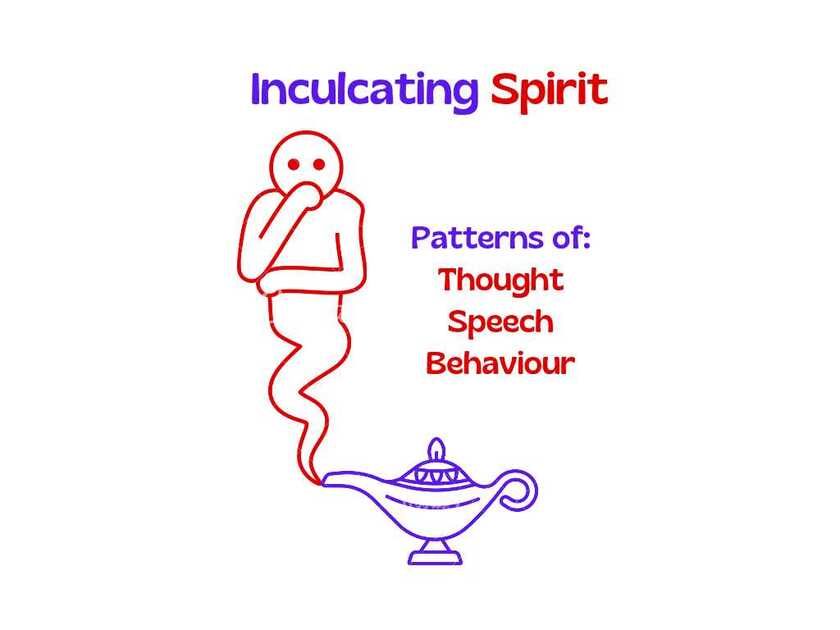
He also likes to discuss contemporary philosophy and science and is interested in putting together a scientifically comprehensive worldview that integrates metaphysics and traditional views of the soul.
Anthropology and ancient history are important as well and Aarvoll is interested in discussing theories of Atlantis, and alternative theories of human evolution and migration.
Wisdom Within — Chapter 59
The Imitation Game
Human beings are creatures of imitation. From the moment we are born, we learn by observing and copying. We mirror the tone of our parents’ voices, the gestures of our friends, the language of our culture. Imitation is how the mind absorbs reality—it’s the bridge between perception and embodiment. What we see repeatedly, we eventually become.⁵³⁴
This instinct, once essential for survival, has been weaponized in the modern age. Today, the models we imitate no longer come from the village or the family, but from the screen. The faces we see on television, in movies, and on social media become our mirrors. They define what it means to be strong, beautiful, intelligent, or desirable. When the same images repeat over and over, they form invisible molds for identity. The more we absorb them, the more we unconsciously shape ourselves to fit them.⁵³⁵
Consider how this works: the awkward, apologetic male who doubts himself; the hyper-independent woman who needs no one; the wise, world-weary mentor who instructs the naïve; the angry, self-destructive rebel who mistakes chaos for freedom. These figures are everywhere. They’re in sitcoms, ads, films, even memes. After a while, the line between fiction and life begins to blur. People don’t just watch these archetypes—they start to perform them. They internalize the mannerisms, the beliefs, the emotional scripts. What began as entertainment becomes social programming.⁵³⁶
This process happens subtly. No one is forced to imitate. It feels natural because imitation is instinctive. We see others receive praise or attention for certain behaviours, and our subconscious notes it as “valuable.” We mimic what seems rewarded and avoid what seems ridiculed. Over time, entire populations shift in their emotional tone and moral orientation without realizing it. Culture evolves not through conscious choice, but through repeated imitation of curated examples.⁵³⁷
The deeper truth is that imitation is spiritual. The human psyche seeks resonance—it wants to align with something that feels alive, meaningful, or powerful. When those examples are authentic, imitation refines the soul. When they are hollow, imitation drains it. That is the hidden danger of mass media: it offers endless reflections, but few of them real.⁵³⁸
To see through this imitation game, one must first recognize how deeply it runs. Observe who and what you mimic. Ask whether the images you absorb lift you upward or keep you trapped in repetition. Learn to model yourself on truth, not trend—on wisdom, not performance.⁵³⁹
When you reclaim your power to choose who you imitate, you reclaim authorship of your own being. That is the end of the imitation game—and the beginning of authenticity.⁵⁴⁰
Commentary:
534: "Human beings are creatures of imitation. From the moment we are born, we learn by observing and copying. We mirror the tone of our parents’ voices, the gestures of our friends, the language of our culture. Imitation is how the mind absorbs reality—it’s the bridge between perception and embodiment. What we see repeatedly, we eventually become."
This passage exposes imitation as the root of human development. The self is not born in isolation—it is sculpted by reflection. Every gesture, belief, and habit originates from what has been mirrored. The profound truth hidden here is that identity itself is mimetic: we become what we behold.
535: "This instinct, once essential for survival, has been weaponized in the modern age. Today, the models we imitate no longer come from the village or the family, but from the screen. The faces we see on television, in movies, and on social media become our mirrors. They define what it means to be strong, beautiful, intelligent, or desirable. When the same images repeat over and over, they form invisible molds for identity. The more we absorb them, the more we unconsciously shape ourselves to fit them."
Imitation once preserved life; now it scripts it. The local has been replaced by the global, the organic by the synthetic. Screens have become the new shamans—projecting archetypes that dictate who we are allowed to be. Through repetition, the collective dream is rewritten.
536: "Consider how this works: the awkward, apologetic male who doubts himself; the hyper-independent woman who needs no one; the wise, world-weary mentor who instructs the naïve; the angry, self-destructive rebel who mistakes chaos for freedom. These figures are everywhere. They’re in sitcoms, ads, films, even memes. After a while, the line between fiction and life begins to blur. People don’t just watch these archetypes—they start to perform them. They internalize the mannerisms, the beliefs, the emotional scripts. What began as entertainment becomes social programming."
Here the archetypal machinery is laid bare. Fiction is not separate from life—it feeds it. Repetition of character types becomes collective hypnosis. Each role rehearsed on screen becomes an available identity template, ready to be inhabited. Society becomes a play, and each citizen an unconscious actor.
537: "This process happens subtly. No one is forced to imitate. It feels natural because imitation is instinctive. We see others receive praise or attention for certain behaviours, and our subconscious notes it as 'valuable.' We mimic what seems rewarded and avoid what seems ridiculed. Over time, entire populations shift in their emotional tone and moral orientation without realizing it. Culture evolves not through conscious choice, but through repeated imitation of curated examples."
Cultural drift is not organic—it is engineered reward. The herd turns its head not toward truth, but toward applause. This is the social algorithm behind every trend: reward determines replication. Thus, imitation becomes evolution by manipulation.
538: "The deeper truth is that imitation is spiritual. The human psyche seeks resonance—it wants to align with something that feels alive, meaningful, or powerful. When those examples are authentic, imitation refines the soul. When they are hollow, imitation drains it. That is the hidden danger of mass media: it offers endless reflections, but few of them real."
The author elevates imitation beyond psychology into metaphysics. To imitate is to align vibrationally. It is an act of devotion, conscious or not. Thus, when the object of imitation is false, the soul imitates emptiness. The mirror becomes a void that consumes the light.
539: "To see through this imitation game, one must first recognize how deeply it runs. Observe who and what you mimic. Ask whether the images you absorb lift you upward or keep you trapped in repetition. Learn to model yourself on truth, not trend—on wisdom, not performance."
Awareness transforms imitation from unconscious mimicry into sacred modeling. Observation becomes purification. To choose your models consciously is to reorient the soul toward the Real. The task is not to stop imitating—but to imitate the eternal.
540: "When you reclaim your power to choose who you imitate, you reclaim authorship of your own being. That is the end of the imitation game—and the beginning of authenticity."
The final note completes the arc: freedom begins when imitation becomes intentional. Authorship replaces programming. To imitate consciously is to create consciously—and in that act, the self is reborn as origin, not echo.
Managed to get a hold of some WiFi from a visitor at the monastery who let me use his device. Just checked my Locals account now and it says my subscription to your channel ends today. This is probably the last time I'll get to text you directly so I'll just say this in brief. What you are doing Aarvoll with your discussions on philosophy, theology, cosmology and ontology is few and far between. The average IQ of the common Westerner has gradually decreased due to various factors caused by elite actors. It's such a shame, which is why I was so drawn to your content in the first place. I've practically binged watched all of your philosophical content, especially your discussions on Neoplatonism which I think is great. Only criticism to the Platonic traditions I would say is that they focus way too much on the structural dynamics of reality's architecture whilst kind of neglecting the actual lived and felt experience of those higher planes of existence, which I think the Dharmic traditions ...
Rest of the chapters are in the link below. I'm leaving for the monastery tomorrow and won't be returning to the worldly life again. I'm sorry if it seemed like I was just imposing my worldview on your channel Aarvoll without your permission. I just saw a lot of myself in you—a noble Aryan spirit who only wants the best for all of human kind—and I couldn't help but wanting to share my ideas with you before I left for good. I really think you could truly create something special out of them.
Wisdom Within — Chapter 60
The Inculcating Spirit
Every culture throughout history carries an inculcating spirit—a living pattern of energy that seeps into those who take part in it. It isn't taught in classrooms or written in manifestos; it's absorbed through rhythm, gesture, language, and imitation. It is the invisible force that tells people how to be—how to walk, speak, dress, and even think. Over time, that force becomes identity. To belong to a culture is to be inhabited by its spirit.⁵⁴¹
Take hip-hop and rap culture, for instance. Its inculcating spirit is one of dominance, resilience, and rebellion. It teaches people to move with confidence, to project power, to defy weakness. It carries the energy of survival—born from hardship, sharpened by struggle. But embedded within that same pulse lies the shadow: aggression, material obsession, and misogyny disguised as pride. Its rhythm gives rise to a walk, a talk, a whole posture toward life—one that radiates defiance but often hides deep pain.⁵⁴²
The Italian ...













